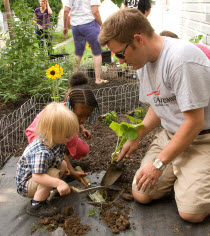

The previously homeless and at-risk families participating in Advocates for Homeless Families’ programs recently prepared and planted a small community, “victory” garden filled with herbs, vegetables, and flowers for their use. The harvested crop of several varieties of tomatoes, squash, cucumbers, and pumpkins will be used in cooking classes held throughout the summer to teach participants the inherent value of growing simple crops to create healthy, delicious meals for the family. Homegrown basil, parsley, thyme, and cilantro also are being cultivated by the adults and children, and these will be used in the cooking classes as well. Participants will be able to cut flowers to beautify and personalize their residences, and the children will be able to make jack-o-lanterns for Halloween this fall. Joe Case explained the purpose of the victory garden was both symbolic and practical. “During World Wars I and II, victory gardens were planted all across the U.S. to reduce the pressure on the public food supply brought on by the war effort,” he said. “These gardens were also a great morale booster in that gardeners could feel empowered by their contribution of labor and the reward of growing some of their own food. In the current era, it is my belief that parents and children, who have been beaten down by poverty and circumstance, need to feel empowered to engineer the changes required to achieve economic and social independence.”


